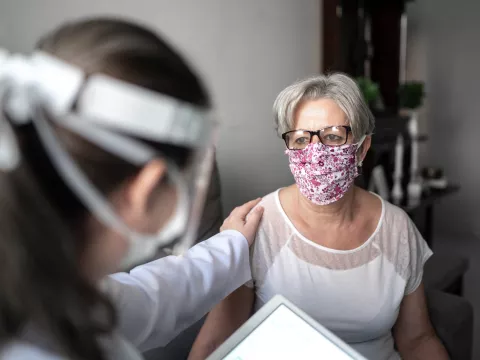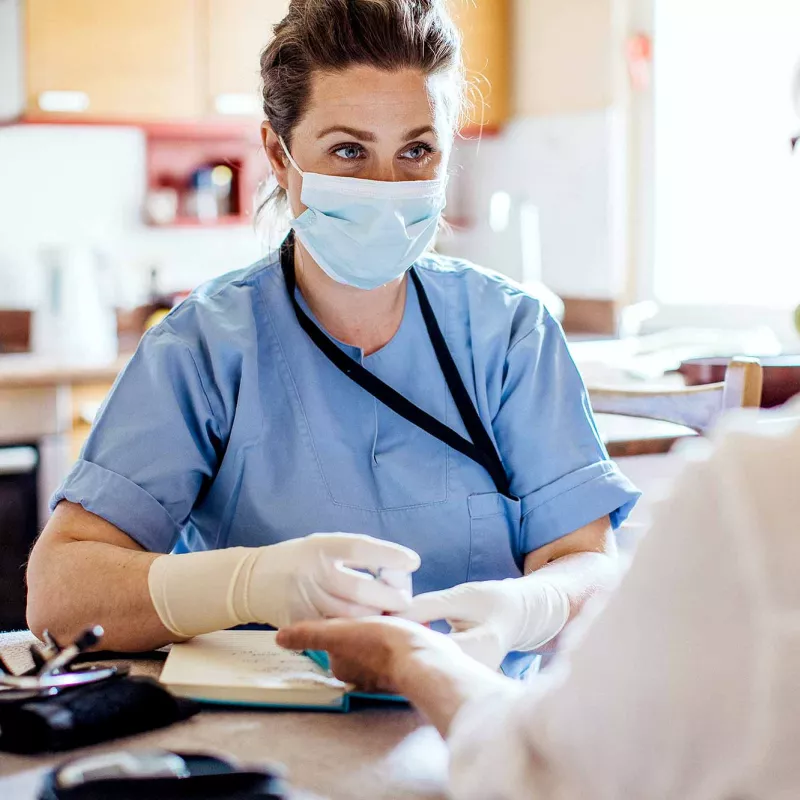
Embrace Life With a Stronger Heart
You aren’t alone: About 5.7 million Americans live with heart failure. In fact, it’s one of the most common reasons people age 65 and older go to the hospital.
While there is no cure, the good news is that, in some cases, you can reverse heart failure damage. But it’s still a serious condition.
With the right medical treatment, medications and lifestyle changes, you can live a full life after being diagnosed with heart failure. And it’s our goal to help you do just that.
We’re here to help you find the right physician or a location that’s convenient for you.
Known for Sharing Our Strength
You want to do more than just cope. You want to embrace life wholeheartedly. That’s why we’re determined to help you lead your best life after a heart failure diagnosis and feel whole in body, mind and spirit.
Our board-certified cardiologists and cardiovascular surgeons perform the latest life-saving diagnostic and treatment procedures to help you heal with the best possible outcome.
Heart Success Center
Learning to live with heart failure has its challenges. With a shared goal to keep you healthy and out of the hospital, our Heart Success Center provides safe transition and recovery support with effective, whole-person care.
One of the Top Transplant Hospitals in Florida
You can count on our experience: Our Orlando institute has performed more heart transplants than any other transplant center in the Southeast.
Pioneers in Cardiac Research
Always working to improve your whole heart means being at the forefront of cardiovascular research. That’s why our doctors participate in clinical trials each year.
Treatments for Heart Failure
The best heart failure treatments usually involve a combination of medication, healthy lifestyle changes and other adjustments that can improve your everyday life.
- Cardiac Rehab
-
Cardiac rehab includes exercise training, education on heart-healthy living and counseling to reduce stress. It stabilizes, slows and may even reverse the progression of heart failure.
- Lifestyle Factors
-
If you’re diagnosed with heart failure, your doctor may recommend:
- Avoiding alcohol and caffeine
- Avoiding tight socks or stockings
- Being physically active
- Developing a social support system
- Eating a low-sodium, low-fat diet
- Getting appropriate vaccinations (like flu or pneumonia)
- Getting sufficient rest
- Losing weight
- Managing stress
- Monitoring blood pressure
- Quitting smoking
- Tracking daily fluid intake
- Weighing yourself daily
- Medications for Heart Failure
-
Depending on your needs, your doctor might prescribe:
- Angiotensin-Converting Enzyme (ACE) Inhibitor to lower blood pressure and decrease the heart’s workload
- Angiotensin Receptor Blocker to lower blood pressure
- Angiotensin-Receptor Neprilysin Inhibitor (ARNI) to improve artery opening and blood flow, reduce sodium retention and decrease strain on the heart
- Beta-Blockers to lower blood pressure and slow your heart rate
- Digoxin to help your heart pump better
- Diuretics to help rid the body of extra water and sodium
- Vasodilator lowers blood pressure by relaxing blood vessels, allowing them to open
Devices and Surgical Procedures for Serious Heart Issues
-
Cardiac Resynchronization Therapy (CRT)
CRT involves a special pacemaker that helps control your heart’s contractions. It might be recommended if your heart’s electrical signals are off, which changes how it normally beats.
-
Heart Transplant Surgery
For severe, progressive heart failure, a heart transplant might be the best option. This procedure replaces your heart with a healthier heart from a donor.
-
Implantable Cardioverter-Defibrillator (ICD)
If you have serious arrhythmias (irregular heartbeats), a defibrillator can help. It’s a device that is surgically placed to keep your heart on pace when a life-threatening abnormal heart rhythm is detected.
-
Left Ventricular Assist Device (LVAD)
If you’re waiting on a transplant, your doctor may recommend an LVAD. It’s a surgically implantable, portable device that can temporarily help weakened ventricles by keeping your heart pumping.
Expert Care for Heart Failure
- Understanding Heart Failure
-
Heart failure is a chronic condition that prevents your heart from pumping enough oxygenated blood to your cells. As a result, your heart’s chambers enlarge to compensate, causing it to pump faster, your blood vessels to narrow and your blood pressure to rise. Your body then directs blood to your heart and brain, away from less important organs.
There are three main types of heart failure:
Congestive Heart Failure
Congestive heart failure happens when your body can’t manage the pressure or volume in your heart or lungs, resulting in fluid buildup in your lungs.
Left-Sided Heart Failure
There are two scenarios you can experience with left-sided heart failure. In some cases, the left ventricle doesn’t contract normally, which means the heart can’t propel blood to the body (systolic failure).
Other times, the left ventricle can’t relax, so the heart can’t fill with enough blood between beats (diastolic failure).
Right-Sided Heart Failure
Often caused by left-sided heart failure, right-sided heart failure causes increased fluid pressure that circulates back to your lungs. This damages your heart’s right side and can cause blood to back up in the body’s veins, causing swelling in your legs, ankles or abdomen.
- Who’s at Risk for Heart Failure?
-
Most frequently, heart failure happens if you have:
- A current or past heart condition
- Coronary artery disease
- Had a heart attack in the past
- High blood pressure
- Heart Failure Warning Signs
-
In the early stages of heart failure, you might not notice symptoms. But as your condition progresses, you may notice:
- Buildup of fluid
- Chronic cough or wheezing
- Confusion or impaired thinking
- Dizziness
- Fast heart rate
- Fatigue or weakness
- Nausea or lack of appetite
- Shortness of breath
- Diagnosing Heart Failure
-
Tests for heart failure often focus on examining your heart’s ventricles (lower chambers) and their ability to pump enough blood to your body, as well as how they relax and fill with the right amount of blood.

Ongoing Care for Heart Failure
Once you’re diagnosed with heart failure, be proactive about monitoring your symptoms. If you feel any changes in your health, see your doctor.
Contact your doctor right away if you experience:
- Changes in physical abilities
- Chest pain
- Confusion, dizziness or lightheadedness
- Coughing up mucus
- Decreased appetite
- Difficulty breathing
- Fever or flu
- Gaining more than three pounds within days
- Swelling in your feet, ankles or other parts of your body

Hearts and Minds United for You
Improving your cardiac health can help you live a long, healthy life — one that’s fulfilling in body, mind and spirit. Every day, we put our hearts and minds to work for you, ensuring you receive whole-person care backed by dedication, expertise and compassion for your condition.

